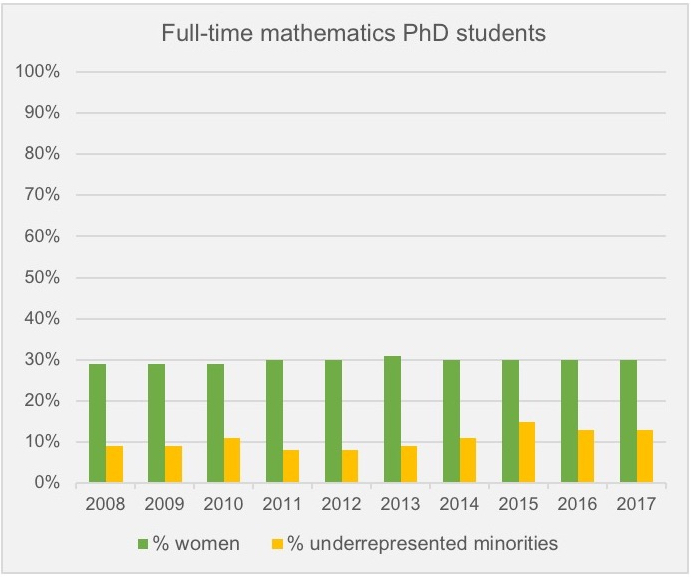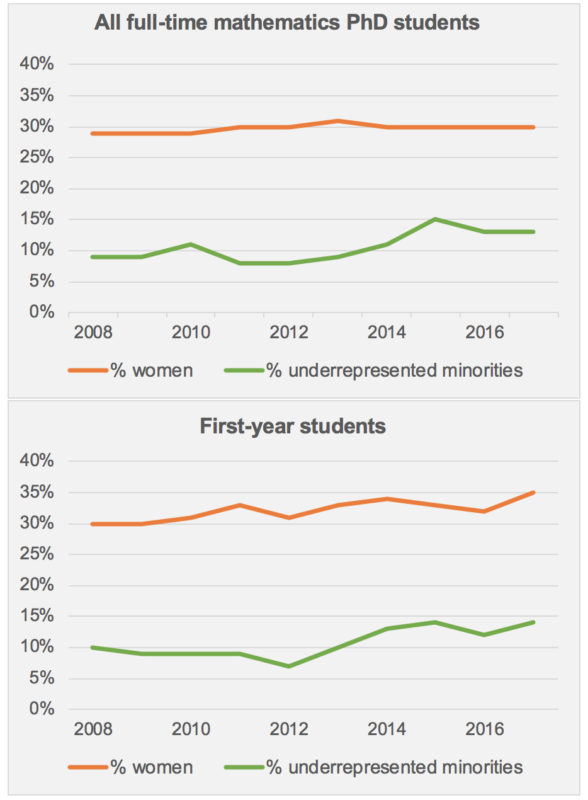
At Cornell, a spotlight on biases and barriers in math
Data from the American Mathematical Society’s annual survey shows small, limited progress in graduate enrollment of both women (green bars) and underrepresented minorities (gold) in U.S. mathematical sciences programs over the decade 2008-17. Minority students made up only 13% of full-dime doctoral students in 2017.
Mathematics is known as one of the most inaccessible disciplines in academia. A Google search for “mathematician” will likely turn up a white man, usually older, surrounded by intractable symbols. And as a field of graduate study, mathematics seems especially inaccessible to Black students. Around 50 faculty and grad students and postdocs in the Department of Mathematics at Cornell University spent part of June 10 in a conference call discussing why.
Several members of the Cornell community participated in #ShutDownSTEM/#ShutDownAcademia, a day for people in STEM fields to reflect on racism, educate themselves about the experiences of Black people within academia, and find actionable items to employ to eliminate racism within their classrooms, departments, and fields.
Alice Nadeau, a postdoctoral fellow in the department, organized the call on “Diversity and Underrepresentation” with Professor Steven Strogatz, and invited those associated with Cornell’s Math Department and the Center for Applied Mathematics. The invitation included a link to MIT mathematics graduate student John Urschel’s Twitter thread on systemic racism within mathematics, which posed a number of deep and perhaps uncomfortable questions about personal responsibility.
The conference call quickly turned to PhD admission practices and departments’ attempts at changing these practices to be more welcoming and inclusive.
Unwritten barriers, tools that reinforce bias
Mathematics, one conference call participant noted, is one of the cheapest disciplines to get into. Yet, as another participant added, there are unwritten expectations for a successful PhD applicant: advanced coursework, research experience, perhaps even publications. Considering that many Black undergraduates lack access to adequate information regarding grad school application practices, requiring them to access and succeed at advanced coursework is not an inclusive practice.

A more uncomfortable topic was that of identifying whether there is something within mathematics or the mathematics community that is unattractive to Black students. Participants also considered hypothetical scenarios where community members witness explicit discrimination and how the community should respond in these situations.
The sharing of resources and perspectives, Nadeau said in an interview after the conference call, was a first step in helping Cornell mathematicians become better allies for the Black members of their own community. She pointed out that the road to eliminating systemic racism in mathematics is a long one. Mathematics research itself can provide tools that reinforce bias. For example, mathematician Cathy O’Neil’s 2016 book Weapons of Math Destruction points out mathematical models currently in use that hide our intrinsic biases and sometimes increase inequality within society. Some of these models are in an area of research called predictive policing, which uses mathematical models to identify places where crime is “most likely” to happen.
How, Nadeau asks, can mathematicians expect Black students to feel welcome in a field that includes research dedicated to enforcing racist practices? We have a long way to go.